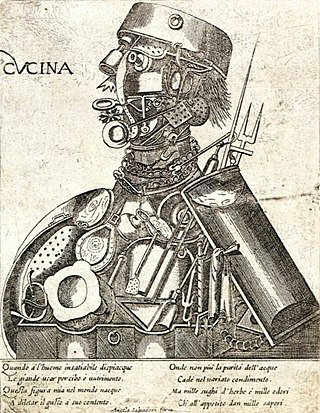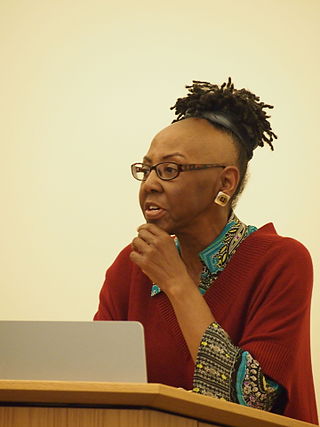Related Research Articles

Eroticism is a quality that causes sexual feelings,as well as a philosophical contemplation concerning the aesthetics of sexual desire,sensuality,and romantic love. That quality may be found in any form of artwork,including painting,sculpture,photography,drama,film,music,or literature. It may also be found in advertising. The term may also refer to a state of sexual arousal or anticipation of such –an insistent sexual impulse,desire,or pattern of thoughts.

Audre Lorde was an American writer,professor,philosopher,intersectional feminist,poet and civil rights activist. She was a self-described "Black,lesbian,feminist,socialist,mother,warrior,poet" who dedicated her life and talents to confronting different forms of injustice,as she believed there could be "no hierarchy of oppressions" among "those who share the goals of liberation and a workable future for our children."

Donna J. Haraway is an American professor emerita in the history of consciousness and feminist studies departments at the University of California,Santa Cruz,and a prominent scholar in the field of science and technology studies. She has also contributed to the intersection of information technology and feminist theory,and is a leading scholar in contemporary ecofeminism. Her work criticizes anthropocentrism,emphasizes the self-organizing powers of nonhuman processes,and explores dissonant relations between those processes and cultural practices,rethinking sources of ethics.
Postcolonial feminism is a form of feminism that developed as a response to feminism focusing solely on the experiences of women in Western cultures and former colonies. Postcolonial feminism seeks to account for the way that racism and the long-lasting political,economic,and cultural effects of colonialism affect non-white,non-Western women in the postcolonial world. Postcolonial feminism originated in the 1980s as a critique of feminist theorists in developed countries pointing out the universalizing tendencies of mainstream feminist ideas and argues that women living in non-Western countries are misrepresented.

"A Cyborg Manifesto" is an essay written by Donna Haraway and published in 1985 in the Socialist Review (US). In it,the concept of the cyborg represents a rejection of rigid boundaries,notably those separating "human" from "animal" and "human" from "machine." Haraway writes:"The cyborg does not dream of community on the model of the organic family,this time without the oedipal project. The cyborg would not recognize the Garden of Eden;it is not made of mud and cannot dream of returning to dust."
Cultural feminism is a term used to describe a variety of feminism that attempts to revalue and redefine attributes culturally ascribed to femaleness. It is also used to describe theories that commend innate differences between women and men.

Intersectionality is a sociological analytical framework for understanding how groups' and individuals' social and political identities result in unique combinations of discrimination and privilege. Examples of these factors include gender,caste,sex,race,ethnicity,class,sexuality,religion,disability,height,age,and weight. These intersecting and overlapping social identities may be both empowering and oppressing. However,little good-quality quantitative research has been done to support or undermine the practical uses of intersectionality.
Cyberfeminism is a feminist approach which foregrounds the relationship between cyberspace,the Internet,and technology. It can be used to refer to a philosophy,art practices,methodologies or community. The term was coined in the early 1990s to describe the work of feminists interested in theorizing,critiquing,exploring and re-making the Internet,cyberspace and new-media technologies in general.
Kitchen Table:Women of Color Press was an activist feminist press,closely related to the National Black Feminist Organization (NBFO),that was started in 1980 by Barbara Smith,Beverly Smith,poet Audre Lorde. Beverly Smith and Barbara Smith,and their associate Demita Frazier,had together cofounded the Combahee River Collective (CRC). The Kitchen Table became inactive soon after Audre Lorde's death in 1992. The motivation for starting a press run by and for women of color was that "as feminist and lesbian of color writers,we knew that we had no options for getting published,except at the mercy or whim of others,whether in the context of alternative or commercial publishing,since both are white-dominated."
Feminist epistemology is an examination of epistemology from a feminist standpoint.

The Cancer Journals is a 1980 book of non-fiction by Audre Lorde. It deals with her struggle with breast cancer.
Cathy J. Cohen is an American political scientist,author,feminist,and social activist,whose work has focused on the African-American experience in politics from a perspective which is underlined by intersectionality. She is currently the David and Mary Winton Green Professor in Political Science and the College at the University of Chicago,and is the former Director of the Center for the Study of Race (2002–05).
Caren Kaplan is professor emerita of American Studies at University of California at Davis,and a figure in the academic discipline of women's studies. Together with Inderpal Grewal,Kaplan has worked as a founder of the field of transnational feminist cultural studies or transnational feminism.
Feminist technoscience is a transdisciplinary branch of science studies which emerged from decades of feminist critique on the way gender and other identity markers are entangled in the combined fields of science and technology. The term technoscience,especially in regard to the field of feminist technoscience studies,seeks to remove the distinction between scientific research and development with applied applications of technology while assuming science is entwined with the common interests of society. As a result,science is suggested to be held to the same level of political and ethical accountability as the technologies which develop from it. Feminist technoscience studies continue to develop new theories on how politics of gender and other identity markers are interconnected to resulting processes of technical change,and power relations of the globalized,material world.

Michelle Parkerson is an American filmmaker and academic. She is an assistant professor in Film and Media Arts at Temple University and has been an independent film/video maker since the 1980s,focusing particularly on feminist,LGBT,and political activism and issues.
Feminist biology is an approach to biology that is concerned with the influence of gender values,the removal of gender bias,and the understanding of the overall role of social values in biological research and practices. Feminist biology was founded by,among others,Ruth Bleier of the University of Wisconsin-Madison. It aims to enhance biology by incorporating feminist critique in matters varying from the mechanisms of cell biology and sex selection to the assessment of the meaning of words such as "gender" and "sex". Overall,the field is broadly defined and pertains itself to philosophies behind both biological and feminist practice. These considerations make feminist biology debatable and conflictive with itself,particularly when concerning matters of biological determinism,whereby descriptive sex terms of male and female are intrinsically confining,or extreme postmodernism,whereby the body is viewed more as a social construct. Despite opinions ranging from determinist to postmodernist,however,biologists,feminists,and feminist biologists of varying labels alike have made claims to the utility of applying feminist ideology to biological practice and procedure.

Sister Outsider:Essays and Speeches is a collection of essential essays and speeches written by Audre Lorde,a writer who focuses on the particulars of her identity:Black woman,lesbian,poet,activist,cancer survivor,mother,and feminist. This collection,now considered a classic volume of Lorde's most influential works of non-fiction prose,has had a groundbreaking impact in the development of contemporary feminist theories. In fifteen essays and speeches dating from 1976 to 1984,Lorde explores the complexities of intersectional identity,while explicitly drawing from her personal experiences of oppression to include sexism,heterosexism,racism,homophobia,classism,and ageism. The book examines a broad range of topics,including love,self-love,war,imperialism,police brutality,coalition building,violence against women,Black feminism,and movements towards equality that recognize and embrace differences as a vehicle for change. With meditative conscious reasoning,Lorde explores her misgivings for the widespread marginalization deeply-rooted in the United States' white patriarchal system,all the while,offering messages of hope. The essays in this landmark collection are extensively taught and have become a widespread area of academic analysis. Lorde's philosophical reasoning that recognizes oppressions as complex and interlocking designates her work as a significant contribution to critical social theory.
Intersectionality is the interconnection of race,class,and gender. Violence and intersectionality connect during instances of discrimination and/or bias. KimberléCrenshaw,a feminist scholar,is widely known for developing the theory of intersectionality in her 1989 essay,"Demarginalizing the Intersection of Race and Sex:A Black Feminist Critique of Antidiscrimination Doctrine,Feminist Theory and Antiracist Politics". Crenshaw's analogy of intersectionality to the flow of traffic explains,"Discrimination,like traffic through an intersection,may flow in one direction,and it may flow in another. If an accident happens in an intersection,it can be caused by cars traveling from any number of directions and,sometimes,from all of them. Similarly,if a Black woman is harmed because she is in the intersection,her injury could result from sex discrimination or race discrimination."
Queer of color critique is an intersectional framework,grounded in Black feminism,that challenges the single-issue approach to queer theory by analyzing how power dynamics associated race,class,gender expression,sexuality,ability,culture and nationality influence the lived experiences of individuals and groups that hold one or more of these identities. Incorporating the scholarship and writings of Audre Lorde,Gloria Anzaldúa,KimberléCrenshaw,Barbara Smith,Cathy Cohen,Brittney Cooper and Charlene A. Carruthers,the queer of color critique asks:what is queer about queer theory if we are analyzing sexuality as if it is removed from other identities? The queer of color critique expands queer politics and challenges queer activists to move out of a "single oppression framework" and incorporate the work and perspectives of differently marginalized identities into their politics,practices and organizations. The Combahee River Collective Statement clearly articulates the intersecting forces of power:"The most general statement of our politics at the present time would be that we are actively committed to struggling against racial,sexual,heterosexual,and class oppression,and see as our particular task the development of integrated analysis and practice based upon the fact that major systems of oppression are interlocking. The synthesis of these oppressions creates the conditions of our lives." Queer of color critique demands that an intersectional lens be applied queer politics and illustrates the limitations and contradictions of queer theory without it. Exercised by activists,organizers,intellectuals,care workers and community members alike,the queer of color critique imagines and builds a world in which all people can thrive as their most authentic selves- without sacrificing any part of their identity.
The Feminist Studies Department at the University of California,Santa Cruz constitutes one of the oldest departments of gender and sexuality studies in the world. It was founded as a women's studies department in 1974. It is considered among the most influential departments in feminist studies,post-structuralism,and feminist political theory. In addition to its age and reputation,the department is significant for its numerous notable faculty,graduates,and students.
References
- ↑ King, Katie (Summer 2014). "Curriculum Vitae".
- 1 2 Haraway, Donna; Reti, Irene (2007). "Edges and Ecotones: Donna Haraway's Worlds at UCSC" (PDF). p. 93. Archived (PDF) from the original on 25 May 2021. Retrieved 25 May 2021.
- ↑ "Alumni". histcon.ucsc.edu. University of California, Santa Cruz. Archived from the original on 25 May 2021. Retrieved 25 May 2021.
- ↑ King, Katherine R. Canons without Innocence: Academic Practices and Feminist Practices Making the Poem in the Work of Emily Dickinson and Audre Lorde, 1987. ProQuest.
- ↑ "Katie King". wgss.umd.edu. University of Maryland. Archived from the original on 25 May 2021. Retrieved 25 May 2021.
- ↑ Boyle, Anne M. "Feminist Generations: The Persistence of the Radical Women's Movement; Theory in its Feminist Travels; Conversations in U.S. Women's Movements; Feminism Beside itself."NWSA Journal, vol. 8, no. 3, 1996, pp. 166. ProQuest.
- ↑ "Lesbian Studies -- Theory in its Feminist Travels: Conversations in U.S. Women's Movements by Katie King." Lambda Book Report, vol. 4, no. 10, 05, 1995, pp. 45. ProQuest.
- ↑ Vie, S. E. "Networked Reenactments: Stories Transdisciplinary Knowledges Tell." Choice, vol. 49, no. 12, 2012, pp. 2261. ProQuest.
- ↑ Colatrella, Carol. "Digital Theory, Inc.: Knowledge Work and Labor Economics." Postmodern Culture, vol. 22, no. 2, 2012. ProQuest.
- ↑ Gillespie, Jeanne L. (2013). "Networked Reenactments: Stories Transdisciplinary Knowledges Tell Katie King. Durham, NC: Duke University Press, 2011". The Journal of American Culture. 36 (4): 386–387. doi:10.1111/jacc.12078. ISSN 1542-734X. Archived from the original on 2021-05-26. Retrieved 2021-05-26.
- ↑ Fuqua, Joy V. (2013). "Visions of Technology, Gender, and Knowledge Production". Women's Studies Quarterly. 41 (3/4): 280–282. ISSN 0732-1562. JSTOR 23611526. Archived from the original on 2021-05-26. Retrieved 2021-05-26.
- ↑ King, Katie (ed.). "Thinking with Donna Haraway -- the adventures begin!". Party Writing for Donna Haraway!. Archived from the original on 2021-05-25. Retrieved 2021-05-25.